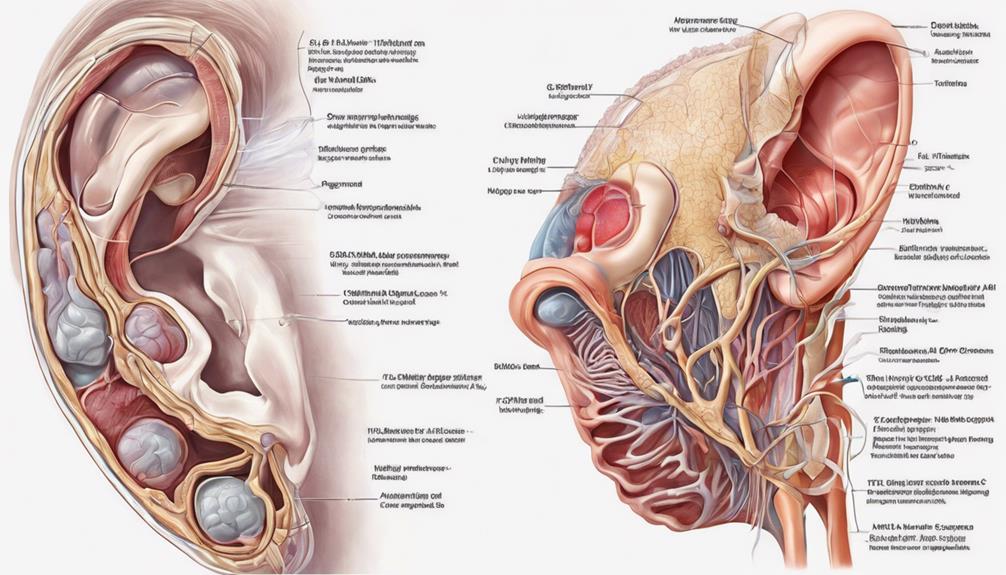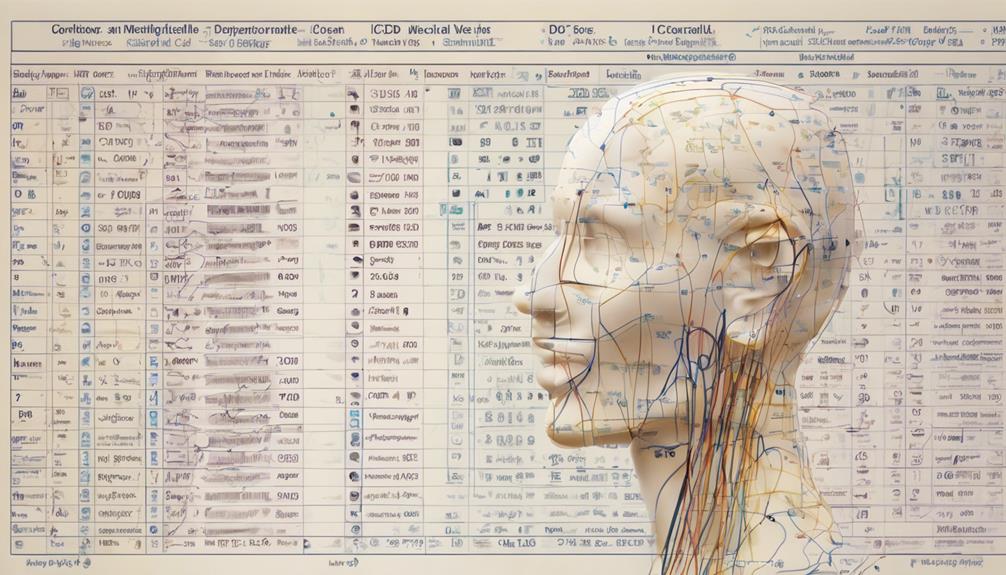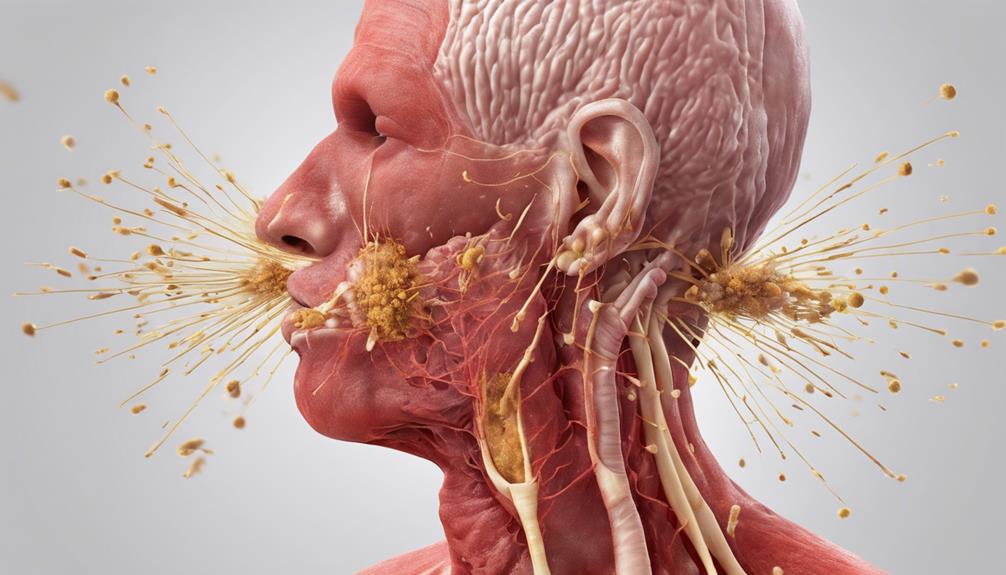Have you ever wondered why chemotherapy treatments can lead to hearing loss?
The connection between chemotherapy and changes in hearing abilities is a topic that warrants attention.
Understanding the mechanisms behind this phenomenon and exploring potential strategies for prevention and management can offer valuable insights for individuals undergoing or planning chemotherapy.
Let's explore the intricate relationship between chemotherapy and hearing health to shed light on this important aspect of cancer treatment.
Key Takeaways
- Chemotherapy can induce hearing loss, especially with platinum-based drugs.
- Monitoring and early detection are vital for managing chemotherapy-related hearing issues.
- Coping strategies like hearing aids and support groups can enhance quality of life.
- Regular communication with healthcare providers is crucial for post-chemotherapy hearing loss management.
Connection Between Chemotherapy and Hearing Loss
Exploring the correlation between chemotherapy and hearing loss sheds light on the potential impact of platinum-based drugs like cisplatin or carboplatin on auditory function. Chemotherapy-induced hearing loss often stems from damage to the delicate inner ear cells responsible for processing sound waves. This damage tends to affect high-pitched hearing first, making it challenging to discern certain sounds or voices clearly.
Individuals undergoing chemotherapy may also experience symptoms like tinnitus, a ringing or buzzing in the ears, as a result of the treatment. It's crucial to recognize that not only platinum-based drugs but also certain immune-targeted therapies for conditions like melanoma can have adverse effects on hearing.
Regular monitoring with audiologists and baseline hearing tests play a vital role in tracking any changes in hearing ability due to chemotherapy. These assessments help healthcare providers intervene early and implement strategies to preserve hearing function whenever possible. By understanding the connection between chemotherapy and hearing loss, individuals can take proactive steps to safeguard their auditory health during treatment.
Types of Hearing Problems From Chemotherapy

The impact of chemotherapy on hearing can manifest in various types of hearing problems, each presenting unique challenges for individuals undergoing treatment.
- Chemotherapy-induced hearing loss: Chemotherapy drugs such as cisplatin and aminoglycoside antibiotics can damage inner ear cells, leading to hearing issues.
- High-frequency hearing loss: Ototoxicity from chemotherapy commonly affects the ability to hear high-pitched sounds, potentially resulting in permanent hearing loss.
- Irreversible hearing loss: Inner ear cell damage caused by platinum-based chemotherapy drugs may lead to irreversible hearing loss due to the limited capacity for cell regeneration.
- Monitoring hearing: Regular hearing tests before and after treatment with ototoxic drugs like cisplatin are essential for detecting and managing potential hearing loss effectively.
Understanding these distinct types of hearing problems resulting from chemotherapy empowers individuals to be vigilant about their auditory health during treatment. By recognizing these challenges, individuals can take proactive steps to mitigate the impact of chemotherapy on their hearing and seek appropriate support and interventions.
Identifying Chemotherapy-Related Hearing Loss
Chemotherapy-related hearing loss can present through various symptoms and manifestations, emphasizing the importance of early detection and monitoring. When undergoing chemotherapy, it's essential to be aware of potential signs of hearing loss. Damage to the inner ear caused by chemotherapy drugs like cisplatin and carboplatin can lead to difficulties in hearing high-pitched sounds. Regular hearing tests with an audiologist play a critical role in identifying chemotherapy-induced hearing loss. Symptoms such as tinnitus, a ringing in the ears, during or after treatment should not be ignored. It's crucial to recognize that chemotherapy-induced hearing loss can be either temporary or permanent, underscoring the need for early recognition and continuous monitoring to address any changes promptly.
| Symptoms | Manifestations | Importance |
|---|---|---|
| High-pitched sound issues | Tinnitus occurrence | Regular testing |
| Inner ear damage | Temporary or permanent | Early detection |
Coping Strategies for Hearing Difficulties

Transitioning from identifying chemotherapy-related hearing loss to coping strategies for hearing difficulties involves empowering individuals to effectively manage and adapt to changes in their hearing abilities.
When facing hearing loss due to chemotherapy, there are several coping strategies that can help improve quality of life and address the emotional impact of these changes:
- Utilizing Hearing Aids: Hearing aids can significantly enhance the quality of life for individuals experiencing chemotherapy-induced hearing loss by amplifying sounds and improving communication.
- Lip-Reading and Visual Cues: Relying on lip-reading and visual cues can assist in communication for those with hearing difficulties, making interactions smoother and more effective.
- Joining Support Groups: Support groups offer emotional and practical support for coping with the challenges of hearing loss, providing a sense of community and understanding.
- Seeking Counseling Services: Counseling services can help manage the emotional impact of hearing difficulties, offering strategies to cope with feelings of frustration, isolation, or anxiety.
Managing Hearing Loss Challenges
Understanding the challenges of managing hearing loss post-chemotherapy is essential for effective support and care. When dealing with chemotherapy-induced hearing loss, limited medication therapies are available to reverse the condition, emphasizing the importance of monitoring and adjusting treatments. Nerve damage, akin to peripheral neuropathy, can contribute to hearing loss, necessitating early recognition and continuous monitoring. Individuals may gradually adapt to hearing loss, potentially leading to underreporting. Therefore, regular communication with healthcare providers is crucial for monitoring and managing any potential hearing issues. Here is a table to summarize the key aspects of managing hearing loss challenges post-chemotherapy:
| Challenge | Importance | Action Required |
|---|---|---|
| Limited Medication Therapies | Monitoring and Adjusting Treatments | Regular follow-ups and treatment evaluations |
| Nerve Damage | Early Recognition and Monitoring | Nerve function tests and symptom assessments |
| Adaptation to Hearing Loss | Underreporting Prevention | Open communication with healthcare providers |
Frequently Asked Questions
What Is the 7 Day Rule in Chemotherapy?
The 7-day rule in chemotherapy is crucial for timing drug administration to minimize side effects. It helps balance treatment effectiveness with potential risks like hearing loss. Following this rule optimizes outcomes while reducing harm to hearing function.
Oncologists carefully adhere to this timeframe, especially with drugs like cisplatin, to manage ototoxicity. Understanding and implementing the 7-day rule is essential for successful chemotherapy treatment and overall well-being.
What I Wish I Knew Before Chemo?
Before chemo, we wish we knew the emotional rollercoaster it can be. The uncertainty, the side effects – it can feel overwhelming. However, with proper support and information, we can navigate this journey.
Understanding potential risks like hearing loss and taking necessary precautions, such as hearing tests, can make a huge difference.
How Does Chemotherapy Cause Ototoxicity?
Chemotherapy can cause ototoxicity by damaging inner ear cells responsible for hearing. Drugs like cisplatin and carboplatin are known to impact hearing, especially high-pitched frequencies. It's crucial to understand these risks for proper monitoring and management.
Immune-targeted melanoma therapies can also contribute to hearing loss. Knowing the specifics of how chemotherapy affects hearing helps in addressing potential issues effectively.
What They Don T Tell You About Chemo?
When it comes to chemotherapy, there are things they don't always tell you. It's crucial for patients to be aware of potential side effects, like hearing loss, which can be permanent.
Being proactive in discussing these issues with your healthcare team is vital for early recognition and management. By staying informed and advocating for your health, you can better navigate the complexities of chemotherapy treatment.
Conclusion
In conclusion, navigating the potential impact of chemotherapy on our hearing can be a sensitive journey. By staying vigilant for symptoms and seeking support from healthcare providers, we can address any concerns with grace and resilience.
Remember, with the right strategies and adjustments, we can face the challenges of hearing loss head-on and continue to thrive in our daily lives. Let's approach this journey with understanding and determination.











